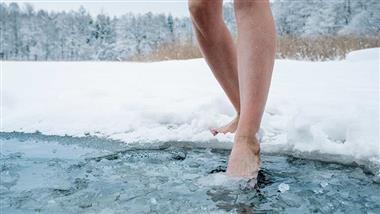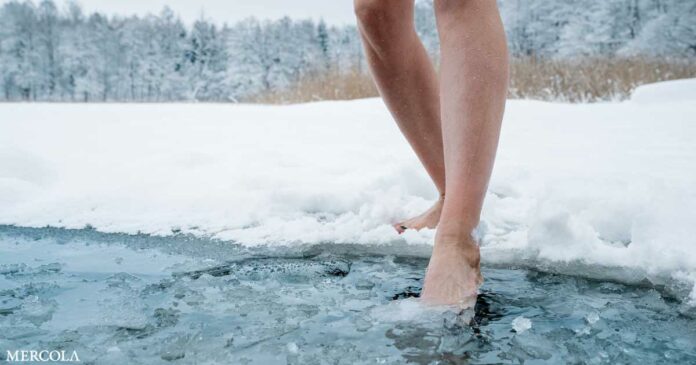
Story at-a-glance
- Exposure to cold water offers mental and physical health benefits
- When your body senses cold temperatures, the sympathetic nervous system, which triggers your “fight-or-flight” response, is activated while blood levels of beta-endorphin and noradrenaline increase
- Research supports the use of cold water swimming to improve mood, relieve depression and boost well-being
- Cold exposure also increases whole-body metabolic rate, relieves pain and builds resilience to stress
- Cold shock can lead to hyperventilation, heart failure and stroke, so you should acclimate your body to cold water swimming gradually and always swim with a buddy
Taking a swim in cold water is a simple, low-cost way to boost your health — but there are some caveats involved. While you don’t want to shock your system or spend too long in very cold water, which poses a risk of hypothermia, exposure to cold water offers mental and physical health benefits.
When your body senses cold temperatures, the sympathetic nervous system, which triggers your “fight-or-flight” response, is activated while blood levels of beta-endorphin and noradrenaline increase. Noradrenaline is released in the brain, as well, and research suggests cold hydrotherapy may relieve depressive symptoms as a result.
“Due to the high density of cold receptors in the skin, a cold shower is expected to send an overwhelming amount of electrical impulses from peripheral nerve endings to the brain, which could result in an anti-depressive effect,” a review in Medical Hypotheses explains.1 This, however, is just the beginning of how cold water swimming, or even cold showers, may help optimize your health.
Swimming in Cold Water May Ease Depression
A team of U.K. researchers published a case study of a 24-year-old woman with depression and anxiety, whose symptoms didn’t improve after multiple medications. She tried weekly open water swimming in cold water, which led to an “immediate” mood boost after every swim. Further, she reported a “sustained and gradual” reduction in symptoms of depression as she continued swimming.
She was also able to reduce, and eventually stop, medications, and was medication-free at her one-year follow-up.2 She told researchers:3
“I really did struggle with depression and anxiety and have tried everything, CBT [cognitive behavioral therapy], talking, several different drugs and nothing worked or I feel numb and in a chemical fog. Although I didn’t enjoy the cold to start with, the effect it had was like a weight being lifted off my shoulders.
Open water swimming works for me, it gets me out and about in to the fresh air and has lifted my mood. I still feel down occasionally, but that is more part of what life throws my way rather than the state I was in before.”
In this case, it’s difficult to determine whether the beneficial effects were due to the cold water or another aspect of the activity, such as exercise, being outdoors, being in water, social encounters she had while swimming or all of the above.
But other research also supports the use of cold water swimming to improve mood. In a study of 61 swimmers who took part in a 10-week outdoor swimming course, increases in positive mood and decreases in negative mood were reported. Further, measures of “total mood disturbance” declined while well-being increased.4
Another study, noting cold water swimming’s potential for boosting self-esteem, reducing tiredness and improving mood and well-being, looked at the feasibility of adding the activity to depression treatment. Depressed patients who regularly participated in cold water swimming had increased well-being scores while measures of sleep quality improved.5 The team concluded:6
“This study indicates that it is possible and safe for patients with depression to participate in regular, supervised CWS [cold water swimming]. Furthermore, regular participation in CWS may improve sleep and well-being.”
In another example, 29 healthy adults participated in cold-water immersion along with breathing exercises and meditation for 10 days, reporting improvements in symptoms of stress, well-being and depression.7
Even taking progressively colder showers once or twice a day may be useful for relieving depression.8 While it’s unclear exactly why cold water exposure may boost mood, it’s believed it may release emotion-regulating neurotransmitters, including serotonin, cortisol, dopamine, norepinephrine and beta-endorphin.9
There Are Risks Involved in Cold Water Swimming
I am no fan cold thermogenesis which is more related to cold plunges than cold water swimming. Cold plunges activate stress hormones which may provide some temporary relief/benefit, but I believe will overall lower your resilience and health and I strongly discourage it. Most of us already have far too many stress hormones activated in our life and we don’t need more that we engage in electively.
I believe many of the benefits being ascribed to cold water swimming could have been achieved by warm water swimming. Movement and swimming are great activities that will generally promote your health, unless the temperature of the water is too cold.
Additionally, there are risks to cold water swimming, which shouldn’t be taken lightly. Cold shock can lead to hyperventilation, heart failure and stroke,10 while cold incapacitation, in which your muscles lose power, making swimming difficult, can lead to drowning.11
Another risk is that “cold water exposure activates both components of our autonomic nervous system, which have opposing effects,” explains Dr. Richard A. Friedman, director of the Psychopharmacology Clinic at Weill Cornell Medical College. A psychiatrist and swimmer who often encourages his patients to try swimming, Friedman wrote in The Washington Post:12
“How you enter the water matters. If you enter the water without getting your face wet, it triggers the sympathetic system, which increases heart rate and blood pressure, sometimes dramatically. In contrast, when cold water hits your face, you get the diving reflex, which activates the parasympathetic system via the vagus nerve, which lowers heart rate and slows things down.
The net effect of these two competing neural reflexes is highly variable. In some individuals with known or perhaps covert heart disease, it can trigger a potentially fatal cardiac arrhythmia — even in apparently young healthy people.”
As a safety precaution, Susan Dawson-Cook of U.S. Masters Swimming recommends gradually building up your tolerance to the cold water:13
“Adapting to the cold water is another important safety precaution. Don’t jump in expecting to swim for 45 minutes. Instead, build up how long you’re in the water gradually so your body can acclimate to how cold the water is.”
It’s not necessary to swim in ice water to gain benefits. Instead, start slowly around 70 degrees F and gradually work your way down to the 40s, giving your body a chance to acclimate in the process. Further, if you’re planning to try cold water swimming, be sure you have a buddy with you and always listen to your body. If you start to feel weak, nauseas or lightheaded, get out of the water and warm up immediately.
- 1,8Med Hypotheses. 2008;70(5):995-1001. doi: 10.1016/j.mehy.2007.04.052. Epub 2007 Nov 13
- 2BMJ Case Rep. 2018; 2018: bcr2018225007
- 3BMJ Case Rep. 2018; 2018: bcr2018225007., Patient’s perspective
- 4Lifestyle Medicine November 10, 2020
- 5,6Nord J Psychiatry. 2023 Jun 28;1-6. doi: 10.1080/08039488.2023.2228290. Online ahead of print
- 7Adv Mind Body Med. 2022;36(3):12-20
- 9Bio Protoc. 2023 Sep 5; 13(17): e4794
- 10National Weather Service, Cold Water Hazards and Safety
- 11The Outdoor Swimming Society, Risks of Cold Water
- 12The Washington Post September 11, 2023
- 13U.S. Masters Swimming May 5, 2021
Source: Original Article
Publish Date: 2023-10-09 07:43:30

